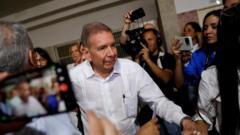Michael Sheils McNamee
BBC News
Vanessa Buschschluter
Latin America editor, BBC News
The opposition candidate in Venezuela’s recent presidential election has arrived in Spain after fleeing his homeland.
A Spanish Air Force plane carrying Edmundo González landed at Torrejon air base in Madrid on Saturday afternoon, after he was granted political asylum.
Mr González had been in hiding in Venezuela, with an arrest warrant issued for him after the opposition disputed July’s presidential election result, which gave incumbent Nicolás Maduro a third term.
The Venezuelan opposition’s overall leader, María Corina Machado, said he had fled “to preserve his freedom, his integrity and his life”.
His departure came as security forces in Venezuela have surrounded the Argentine embassy in the capital, Caracas, where six opposition figures have been sheltering.
The country’s foreign ministry alleged that terrorist acts were being plotted inside.
Ms Machado accused Mr Maduro’s administration of unleashing “a brutal wave of repression” following the election, the results of which many nations in the region have questioned.
Venezuela’s Vice-President Delcy Rodríguez said Mr González had asked the Spanish government for political asylum.
She said in a social media post that after “voluntarily” seeking refuge at the Spanish embassy in Caracas some days ago, Venezuela had agreed to his safe passage.
Spain’s Foreign Minister Jose Manuel Albares had earlier said that Spain had granted Mr González asylum as it was “committed to the political rights” of all Venezuelans.
The departure of the 75-year-old came a week after Venezuelan authorities issued an arrest warrant for him, accusing him of conspiracy and other crimes.
The opposition claimed it had evidence Mr González had won by a comfortable margin, and uploaded detailed voting tallies to the internet which suggest Mr González beat Mr Maduro convincingly.
Washington, the EU and other powers in the region have refused to recognize Mr Maduro as the winner without Caracas releasing detailed voting data.
The European Union foreign policy chief, Josep Borrell, described Mr González’s flight as “a sad day for democracy in Venezuela”.
He added: “In a democracy, no political leader should be forced to seek asylum in another country.”
Image source, Reuters
The opposition has questioned the validity of a victory for President Maduro

